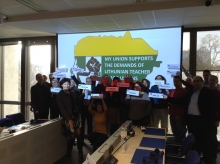Report on the Annual General Meeting of the European Sectoral Social Dialogue for Education – 19th February 2016 Brussels

During discussion on ESSEDE’s work programme for 2016/17, the EPSU representatives suggested:
- Privatisation/outsourcing of education services, as this is one of the main priorities of Public Service International’s Education Sector and Cultural Workers’ (ESCW) network.
- Workload – Funding cuts and job losses together with increasing accountability, target setting and increased pupil numbers mean that there is more work for fewer staff.
- Remuneration and social protection. Again, this is an ESCW network priority. Austerity is holding down members’ wages and affecting their terms and conditions.
The employers had surveyed their members on how the outcomes of ESSDE projects had made an impact. The variation of distribution and impact was noted. The unions agreed there was a problem in dissemination of information, but also how national social dialogues work. The unions called for strengthened outcomes with strong recommendation. The employers were not keen on agreeing recommendations; they preferred joint guidance, which is weaker.
The final joint work programme was agreed. The main areas are:
- Cooperation with the EU commission and involvement of social partners
- Public/private development
- Paris declaration (on civic education and migrant integration)
- Open and innovative education – including digital
- Supporting teachers, trainers and school leaders - professional support
- Making the teaching profession more attractive
- Vocational education and apprenticeships
- Higher education and research – including mobility and gender
- High quality skills and competences
- Promotion of skills agenda
- Monitor ESSDE outcomes
- Communication strategy
- Capacity building – dialogue through knowledge transfer and training
- Promoting decent workplaces for a healthier working life
Sophia Eriksson from the European Commission presented ‘New priorities for European Co-operation in Education and Training, and Investment in Education in the EU.’
The new priorities cover all learning – from pre-school and informal education and lifelong learning. They were adopted at the November EU Council meeting.
The six priorities:
- Relevant and high quality knowledge skills and competencies developed through lifelong learning, focusing on learning outcomes for employability innovation, active citizenship and well-being
- Inclusive education equality, equity non-discrimination and the promotion of civic competencies
- Open and innovative education and training, including fully embracing the digital area
- Strong support for teachers, trainers, school leaders and other education staff
- Transparency and recognition of skills and qualifications to facilitate learning and labour mobility
- Sustainable investment, quality and efficiency of education and training systems
The European Fund for Strategic Investments (EFSI) would also oversee new funds consisting of loans of a minimum of 10 million euros. These would be offered through the EU investment bank and would focus on riskier investments. Eligible sectors would include ‘environment, human capital, culture and health, in particular through education and training, cultural, and creative industries’
The EU commission saw these loans as an addition and not a replacement of national funds or privatisation.
EPSU delegates commented that what starts as ‘additional money’ usually leads to the withdrawal of public funds. Examples were given which showed that costs increased and the private sector always made money, demanding to be paid even when the original projects were no longer needed.
Sophia responded that the commission had called for an increase in public investment; that it shouldn’t be replaced and that additional private capital should be tried. The union side, however, was not convinced by her comments. We are concerned that EU civil servants lack experience in this area and that private companies are well-versed in how to easily exploit well-meaning civil servants.
ESSDE projects:
The meeting studied four recent projects:
- Supporting early career researchers in higher education in Europe. This project had been completed. The report showed the importance of striking the balance between research and teaching activities, promoting employability, career development, gender issues, and fixed term contracts. EPSU delegates noted that they hadn’t seen the final report and would be happy to circulate it.
- Professional autonomy, accountability and efficient leadership in schools. This project had been completed. There is a need for balance between autonomy and accountability, and it is important to have CPD and networking.
- Promoting the education social dialogue among member states. The second phase of the project was mainly focused on spreading social dialogue in newer and smaller EU states.
- Promoting decent workplaces for a healthier working life. This has just started and looks to improve the working environments. EPSU delegates made a strong suggestion that workload is a key part of this.
Lithuanian Teachers’ Strike
At the end of the meeting, the union side gathered for a photograph to show solidarity with the six teacher trade unions in Lithuania that were demanding that the wages of teachers in Lithuania, which have been frozen for eight years, should be restored.

